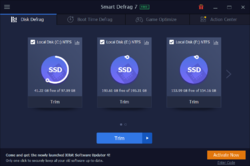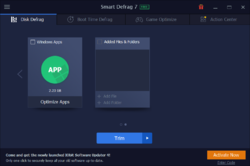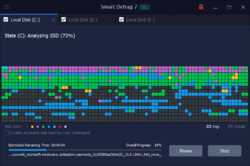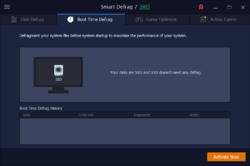Täglich bieten wir KOSTENLOSE lizenzierte Software an, die ihr sonst bezahlen müsstet!

Giveaway of the day — Smart Defrag Pro 7
Smart Defrag Pro 7 war am 3. August 2021! als Giveaway verfügbar!
HINWEIS: Die kostenlose Version wechselt nach der Lizenzaktivierung zur Pro-Version.
Smart Defrag ist ein zuverlässiges, stabiles und dennoch benutzerfreundliches
Tool, das für höchste Festplattenleistung entwickelt wurde. Im Gegensatz zu anderen herkömmlichen Tools, die nur eine Defragmentierung bieten, rationalisiert Smart Defrag eure Dateien auch intelligent basierend auf der Häufigkeit, um den Festplattendatenzugriff zu beschleunigen.
Mit der verbesserten IObit-Defragmentierungs-Engine kann Smart Defrag HDD defragmentieren und SSD trimmen, um die Festplattenzugriffsgeschwindigkeit zu beschleunigen und die Haltbarkeit der Festplatte zu verbessern. Die Software bietet auch eine spezielle Optimierung für den Dateiorganisationsalgorithmus unter Windows 10, um euch einen schnelleren Datenzugriff zu ermöglichen. Boot Time Defrag kann die Windows-Registry defragmentieren, um mehr belegten RAM freizugeben und die Systemstabilität zu gewährleisten, während ihr Boot Time Defrag euren Anforderungen entsprechend anpassen könnt. In der Zwischenzeit stellen Auto Defrag und Scheduled Defrag sicher, dass eure Festplatten immer auf ihre optimale Leistung optimiert sind. Darüber hinaus wurde Game Optimize entwickelt, um Spielern ein besonders flüssiges Spielerlebnis zu bieten. Mit Disk Health könnt ihr euren Festplattenstatus in Echtzeit überwachen.
Zusammenfassend ist Smart Defrag ein unverzichtbares Tool zur Festplattenoptimierung für schnelleren Datenzugriff, flüssigeres Spielen und schnellere Verarbeitung unter Windows.
System-anforderungen:
Windows XP/ Vista/ 7/ 8/ 8.1/ 10
Herausgeber:
iObitHomepage:
http://www.iobit.com/iobitsmartdefrag.phpDateigröße:
15.6 MB
Licence details:
6 Monate mit vollem Support
Preis:
$19.99





Kommentare zum Smart Defrag Pro 7
Please add a comment explaining the reason behind your vote.
Years ago, in the days of FAT and slow disks (access times ~25 ms) obtaining a whole file was a lengthy process. If you wanted to store a 1 MB file, it would find a spare bit of space, save what it could, then find another spare bit of space, etc. Eventually the file would be saved, albeit fragmented all over the place. As files were deleted, they would free space for other files. It was common for a large file to be split 20 or 30 times.
Fast forward to today where we have access times of ~9ms and with SSD drives, faster than that. Also, most PCs use NTFS file system instead of FAT. When a file needs to be saved, NTFS finds a space large enough for the file. Obviously files can grow over time (log files, etc) so fragmentation can still occur, but at a lot less frequency than before. With the fast access times, most users wouldn't even be aware. And with SSD drives, you don't want to defrag at all - this can cause unnecessary writes to the drive, which for SSDs are finite.
In summary, while the software has a nice GUI and does work (Windows has defrag software built in, and does schedule defrags when idle) it does seem a bit superfluous - a bit like registry cleaners. Probably good once, but times and computers have moved on.
Save | Cancel
I was going to comment until I saw Chris' comment (#1). He hit the nail on the head. Two years ago I switched to an SSD and have not defragged since. Windows has a built trim feature and it works great. Get this software if you want but I will pass.
Save | Cancel